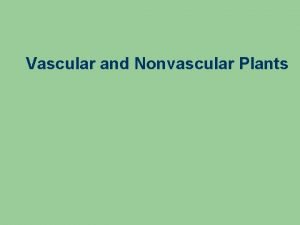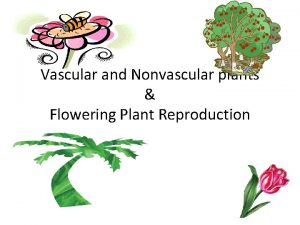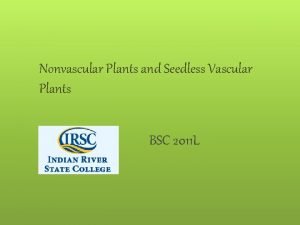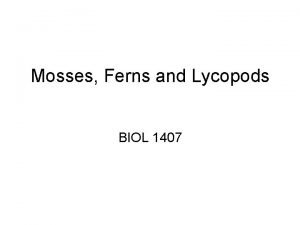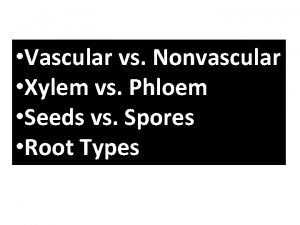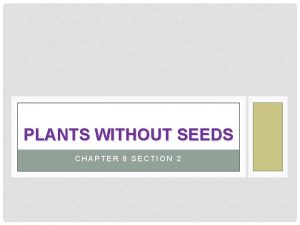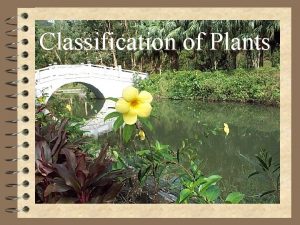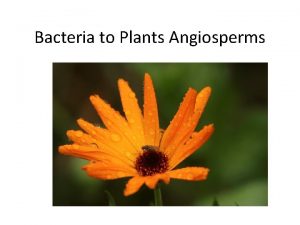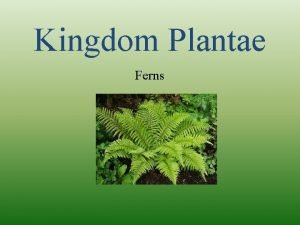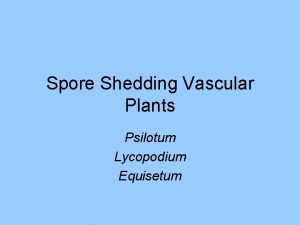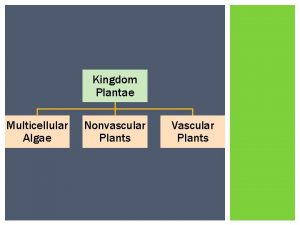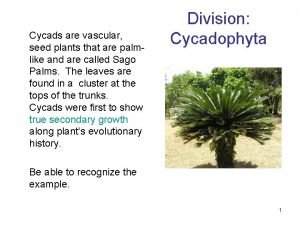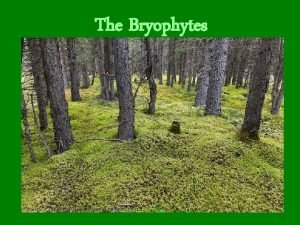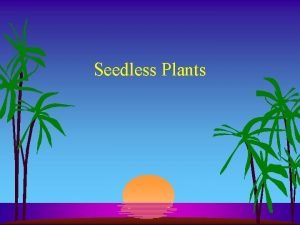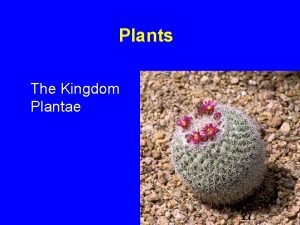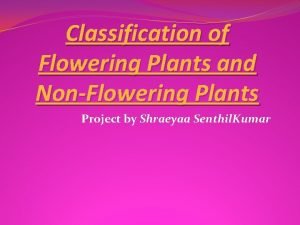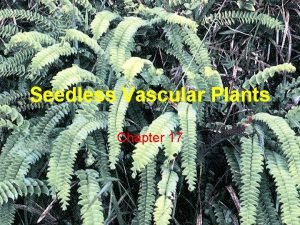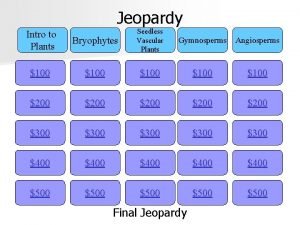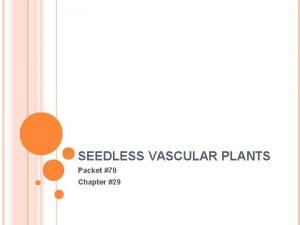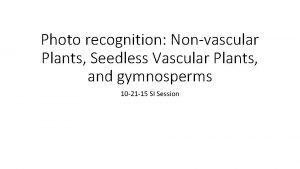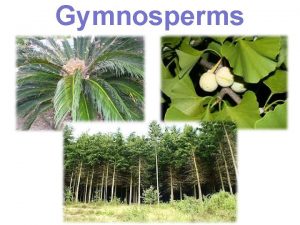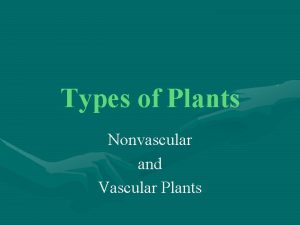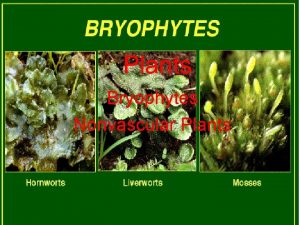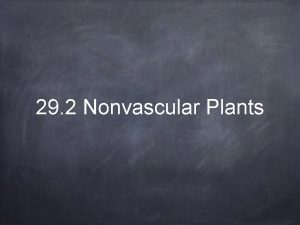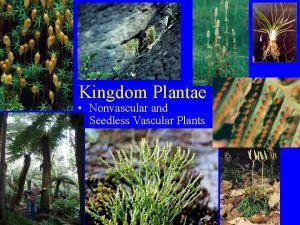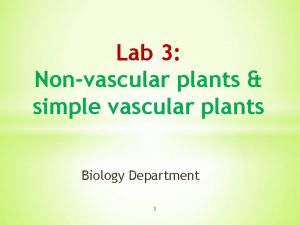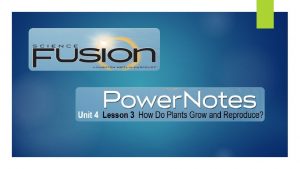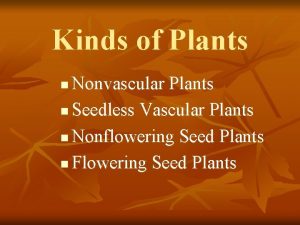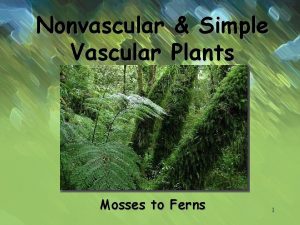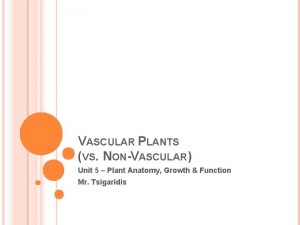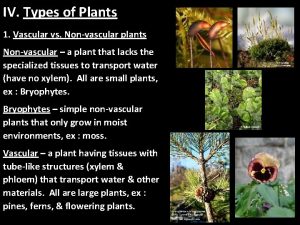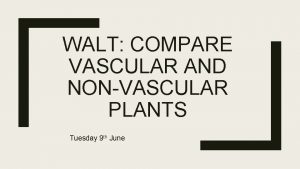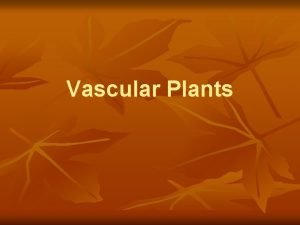Non Vascular Plants What are Nonvascular Plants Traits























- Slides: 23

Non Vascular Plants

What are Nonvascular Plants Traits of Nonvascular plants: 1) No vascular tissue 2) May have leaf like structures but without vascular tissue they have. . . -

What are Nonvascular Plants Traits of Nonvascular plants: 1) No vascular tissue 2) May have leaf like structures but without vascular tissue they have. . . -no true leaves (leaflike) -no true roots (rootlike) -no true stems (stemlike) 3) Gametophyte is dominant

Limits of Non Vascular Plants Height Limits: No “pipe work” to bring water to higher parts of plants so plants stay short. Habitat restrictions

Limits of Non Vascular Plants Height Limits: No “pipe work” to bring water to higher parts of plants so plants stay short. Habitat restrictions: Lack waxy cuticle layer. Need moist places so leaflike parts do not dry up. Some have a dormant period that allows them to survive dry weather.

Two main groups of non vascular plants 1) Liverworts Two types: Leafy and Thallus

Liverworts Structure:

Liverworts Structure:

Liverworts Structure:

Function of Parts Part Thallus Rhizoids Function Main body of plant. Supports, Photosynthesis (leaflike) Anchor plant (rootlike)

Function of Parts Part Thallus Rhizoids Gemma cups Gametophyte Function Main body of plant. Supports, Photosynthesis (leaflike) Anchor plant (rootlike) Hold gemma (cells capable of forming new plants) Hold egg and sperm

Two main groups of non vascular plants 2) Mosses

Structure: Moss

Reproduction Asexual Reproduction: Reproduce by fragmentation.

jk

jk

jk


Adaptation and Importance 1) Able to thrive mircohabitats. -eg. Small cracks in a concrete wall or a small pit in tar roof Importance:

Adaptation and Importance 1) Able to thrive mircohabitats. -eg. Small cracks in a concrete wall or a small pit in tar roof Importance: - Create areas for other organisms to live - Pioneer species in primary succession.

Adaptation and Importance 1) Able to thrive mircohabitats. -eg. Small cracks in a concrete wall or a small pit in tar roof Importance: - Create areas for other organisms to live - Pioneer species in primary succession. Moss moves in Over time moss starts to die Dead moss creates topsoil which allows other plants to move in

Adaptations and Importance 2) Holds water - Dead mosses contain empty spaces. These empty spaces fill with water. Importance - Increases the amount of water available for plants - Used by humans to increase moisture content in garden soil

Adaptations and Importance 3) Grows in shaded forests Importance - Retains moisture by blocking evaporation Forests don’t dry up as fast
 Reproduce by spores
Reproduce by spores Non vascular plants
Non vascular plants Anthiridium
Anthiridium Vascular vs nonvascular plants
Vascular vs nonvascular plants Vascular vs nonvascular
Vascular vs nonvascular Club mosses, horsetails and ferns are types of _____.
Club mosses, horsetails and ferns are types of _____. Mikael ferm
Mikael ferm Vascular and non vascular difference
Vascular and non vascular difference Is a gerber daisy vascular or nonvascular
Is a gerber daisy vascular or nonvascular Coniferophyta vascular or nonvascular
Coniferophyta vascular or nonvascular Kingdom of ferns
Kingdom of ferns Psilotum
Psilotum Marine plantae
Marine plantae Cycads: vascular tissue
Cycads: vascular tissue Seedless nonvascular plants
Seedless nonvascular plants Nutritional habits of hypnum sp
Nutritional habits of hypnum sp Multicellular dependent embryos
Multicellular dependent embryos Common characteristics of plantae
Common characteristics of plantae Flowering plants and non flowering plants similarities
Flowering plants and non flowering plants similarities 3 types of seedless vascular plants
3 types of seedless vascular plants A popular seedless vascular plant is _____.
A popular seedless vascular plant is _____. Seedless vascular plants phylum
Seedless vascular plants phylum Image of a cat
Image of a cat Advantages of gymnosperms
Advantages of gymnosperms
